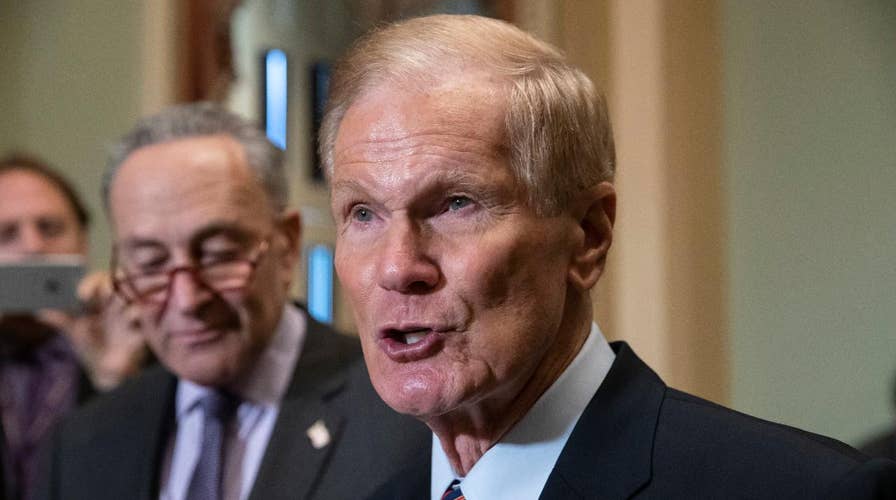Senator Nelson concedes following Florida election recount
Democratic Senator Bill Nelson to make statement regarding Florida election recount; Phil Keating has the latest in Florida.
Florida's dramatic and controversial election season finally came to an end this weekend after races for U.S. Senate and governor went to Republican Gov. Rick Scott and former U.S. Rep. Ron DeSantis, respectively. The results mean that the Sunshine State has two Republican senators for the first time since Reconstruction and all but one of Florida's state offices are held by the GOP.
Three-term Democratic Sen. Bill Nelson conceded to Scott on Sunday, drawing the hotly contested Senate race to a close after 12 days of legal wrangling. On Saturday, Democrat Andrew Gillum conceded to DeSantis in their own contentious race for the Florida governor’s mansion.
Nelson gave up the fight on a day when Florida’s 67 counties had to submit their official results after a sometimes bumpy recount. Those results showed the Democrat trailing Scott by approximately 10,000 votes. DeSantis' margin over Gillum was a comparatively comfortable 32,463 votes out of more than 8 million cast, according to the Florida Secretary of State's Office.
Scott will join Republican Sen. Marco Rubio in the upper chamber of Congress. When he is sworn in next year, it will mark the first time since 1875 that both senators from Florida have been Republicans.
Both races went to recounts, leaving the outcome in the balance for more than a week and giving residents and authorities unwelcome flashbacks.
Florida’s history of election woes dates back to 2000, when it took more than five weeks for the state to declare George W. Bush the winner over Vice Presiden Al Gore by 537 votes, thus giving Bush the presidency. Back then, punch-card ballots were punch lines. Photos of election workers using magnifying glasses to search for hanging chads and pregnant chads symbolized the painstaking process.
“We’re the only state that has problems year after year,” the 58-year-old Mark Toepfer said, shaking his head. “Why is it like this? Is it the people in charge? Are our machines not like other states’ machines? Fraud? Incompetence? It’s hard to say.”
Add to this a litany of other voting problems: Palm Beach County’s tallying machines went on the fritz during the recount due to age and overwork. The electricity went out in Hillsborough County during a machine recount and resulted in an 846-vote deficit. Broward County missed the state deadline to turn in recount results by two minutes.
As a judge recently put it, Florida is “the laughingstock of the world” when it comes to voting.
“We have we have been the laughingstock of the world, election after election, and we chose not to fix this,” U.S. District Judge Mark Walker said in court on Thursday.
The melodrama wasn't limited to the gubernatorial and senatorial races. The race for state agriculture commissioner required a manual recount as well.
Results posted Sunday showed Democrat Nikki Fried defeating Republican Matt Caldwell by 6,753 votes out of 8 million cast.
If the results are certified Tuesday, Fried will succeed Republican Adam Putnam, who was barred from seeking a third term and ran unsuccessfully for the Republican gubernatorial nomination.
With Nelson's defeat, Fried would be the only Florida Democrat to hold a statewide office. Despite Fried's status as the lone holdout in a GOP-dominated state, her victory could have nationwide implications.
Under Florida law, the state's agriculture commissioner is the issuer and manager of concealed weapons licenses and conservative Republicans with A+ ratings from the NRA have held the office for a very long time. Following the Feb. 14 mass shooting at Marjory Stoneman Douglas High School in Parkland, Democrats who back more restrictive gun laws seized the opportunity and spent a lot of money on trying to take this office. And they succeeded.
Traditionally, those seeking to be agriculture commissioner have an extensive background in agriculture. Caldwell and Putnam both fit this mold, coming from a long line of family farmers.
By contrast, Fried is a Miami lawyer with no background in agriculture. She fought foreclosures during the housing crisis and made gun control and medical marijuana her top campaign issues. She promised to end the National Rifle Association’s influence over the state’s concealed carry program and has been quoted as wanting to “reform” it, though it’s unclear how or by what legal means.
Prior to the Parkland shooting this past February, it would be laughable to think a politician such as Fried could become agriculture commissioner in Florida.
There were no such dramatics in the race to be the state's attorney general, which was won by Republican Ashley Moody, a former judge and federal prosecutor from the Tampa area. Moody defeated Democratic state Sen. Sean Shaw, who had never before prosecuted a case. Moody will succeed Republican Pam Bondi, who was barred from seeking re-election because of term limits.
“The preparation for this role really began a long time ago, beginning with my father, a judge who taught me that the strength and resilience of our society hinges on a fair judicial system,” the Republican told TCPalm. “Not only a fair judicial system but one that is perceived as fair. And I will work towards that end every day as the attorney general.”
Rounding out a triumphant evening for Florida Republicans, Chief Financial Officer Jimmy Patronis won a full term by defeating Democratic state Sen. Jeremy Ring.
Patronis was appointed by Scott in June 2017 to fill the remainder of Republican Jeff Atwater's term after Atwater accepted a job at Florida Atlantic University. The 46-year-old Patronis served eight years in the Florida Legislature before Scott appointed him to the state board that regulates utilities.
Fox News’ Eben Brown and The Associated Press contributed to this report.













































